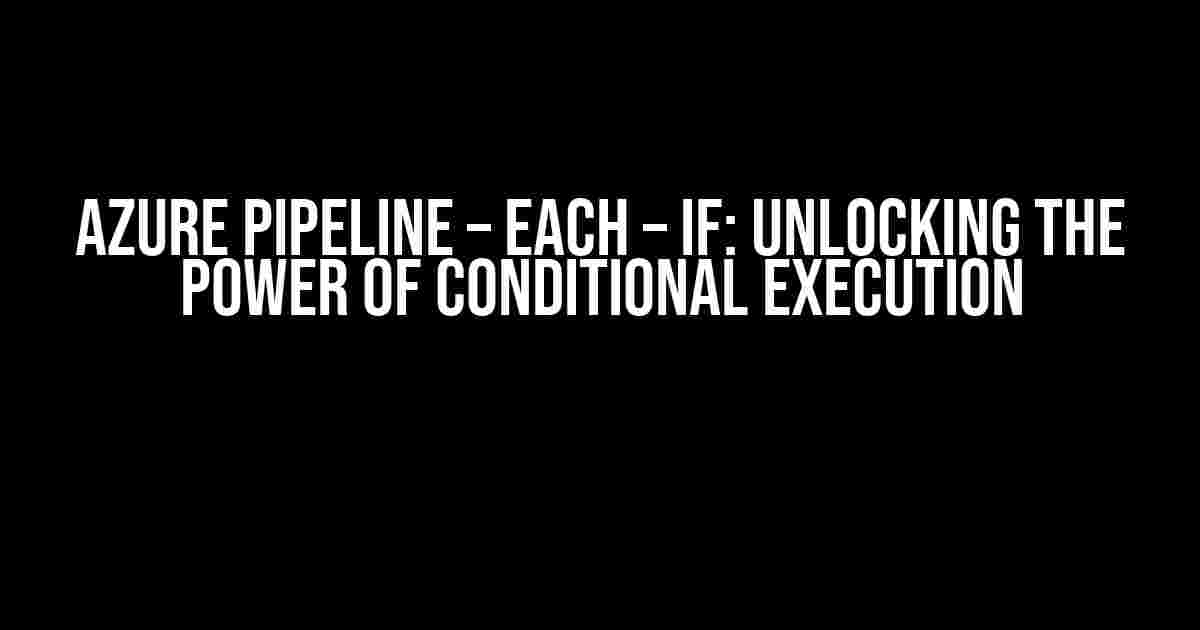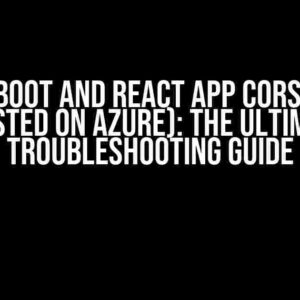Are you tired of tedious pipeline scripting and cumbersome conditional logic? Do you wish you had a more elegant way to execute tasks only when certain conditions are met? Look no further! In this article, we’ll delve into the world of Azure Pipelines and explore the magic of using “Each” and “If” together to streamline your pipeline development.
What is Azure Pipelines?
Azure Pipelines is a continuous integration and continuous deployment (CI/CD) service offered by Microsoft Azure. It enables you to automate the build, test, and deployment of your software projects, leveraging a robust and flexible pipeline architecture. With Azure Pipelines, you can define a sequence of tasks that run in a specific order, allowing you to orchestrate complex workflows with ease.
What is the “Each” keyword?
The “Each” keyword in Azure Pipelines is a powerful construct that allows you to iterate over an array or object and execute a set of tasks for each item. This can be particularly useful when working with collections of environments, repositories, or other data structures. The “Each” keyword is often used in conjunction with the “If” keyword to add an additional layer of conditional logic.
Syntax and Example
steps:
- task: Script@2
displayName: 'Run script on each item'
each:
variable: item
in: ${{ parameters.myArray }}
script: |
echo "Processing $(item)"
# Perform some action on $(item)
In this example, the pipeline will iterate over the array stored in the “myArray” parameter and execute the script task for each item. The “each” keyword specifies the variable name (“item”) and the array to iterate over.
What is the “If” keyword?
The “If” keyword in Azure Pipelines is used to add conditional logic to your pipeline scripts. It allows you to evaluate an expression and execute a set of tasks only if the condition is true. This can be useful for bypassing tasks that are not applicable or skipping unnecessary steps.
Syntax and Example
steps:
- task: Script@2
displayName: 'Run script only if condition is true'
if: eq(variables['myVar'], 'true')
script: |
echo "Condition is true, executing script"
# Perform some action
In this example, the pipeline will execute the script task only if the “myVar” variable is set to “true”. The “if” keyword specifies the condition to evaluate, and the task will be skipped if the condition is false.
Combining “Each” and “If” for Conditional Execution
Now that we’ve covered the basics of “Each” and “If”, let’s explore how to combine them to achieve conditional execution on a per-item basis.
Example: Running a task only if a condition is true for each item
steps:
- task: Script@2
displayName: 'Run script on each item if condition is true'
each:
variable: item
in: ${{ parameters.myArray }}
if: eq(item.condition, 'true')
script: |
echo "Processing $(item) since condition is true"
# Perform some action on $(item)
In this example, the pipeline will iterate over the “myArray” parameter and execute the script task only if the “condition” property of each item is set to “true”. This allows you to dynamically skip or execute tasks based on the properties of each item.
Use Cases for “Each” and “If” in Azure Pipelines
Now that we’ve covered the basics of “Each” and “If”, let’s explore some practical use cases for combining these keywords in Azure Pipelines:
- Environment deployment: Use “Each” to iterate over a list of environments and deploy an application only if the environment meets certain conditions (e.g., production, staging, or dev).
- Repository filtering: Use “If” to skip tasks for repositories that don’t meet specific criteria (e.g., public or private repos, specific branches, or certain file patterns).
- Dynamic task execution: Use “Each” and “If” to execute tasks only for specific items in an array or object, based on properties or conditions.
- Matrix build optimization: Use “If” to skip unnecessary build tasks for certain configurations, and use “Each” to iterate over a matrix of build configurations.
Best Practices for Using “Each” and “If” in Azure Pipelines
When using “Each” and “If” in Azure Pipelines, keep the following best practices in mind:
- Keep it simple: Avoid nesting multiple “Each” and “If” statements, as this can lead to readability and maintenance issues.
- Use descriptive variable names: Clearly label your variables and arrays to improve code readability and reduce errors.
- Test and debug: Thoroughly test and debug your pipeline scripts to ensure correct behavior and handling of edge cases.
- Document your pipeline: Include clear comments and documentation within your pipeline script to facilitate understanding and maintenance.
| Keyword | Description |
|---|---|
| Each | Iterate over an array or object and execute tasks for each item |
| If | Evaluate a condition and execute tasks only if true |
In conclusion, the combination of “Each” and “If” in Azure Pipelines provides a powerful way to execute tasks conditionally, based on the properties of individual items in an array or object. By following best practices and exploring creative use cases, you can unlock the full potential of Azure Pipelines and streamline your pipeline development.
Happy pipelining!
Frequently Asked Question
Get ready to master Azure Pipelines with Each and If statements! Here are the top 5 questions and answers to help you navigate these powerful features:
What is the purpose of the Each statement in Azure Pipelines?
The Each statement in Azure Pipelines allows you to loop through an array or an object and execute a set of tasks for each item. It’s a game-changer for automating repetitive tasks and making your pipelines more efficient!
How do I use the If statement in Azure Pipelines to execute a task only if a certain condition is met?
To use the If statement in Azure Pipelines, you need to specify the condition that must be met using a boolean expression. For example, `if eq(variables[‘buildConfiguration’], ‘Debug’)` would execute a task only if the `buildConfiguration` variable is set to `Debug`. Simple, yet powerful!
Can I use the Each statement inside an If statement in Azure Pipelines?
Yes, you can! This is called a nested loop, and it’s a great way to add an extra layer of complexity to your pipeline logic. For example, you could use an If statement to check if a certain condition is met, and then use an Each statement to loop through an array and execute tasks for each item. The possibilities are endless!
How do I access variables within an Each loop in Azure Pipelines?
Within an Each loop in Azure Pipelines, you can access variables using the `$(item)` syntax, where `item` is the current item being processed in the loop. For example, `$(item.name)` would give you the value of the `name` property for the current item. Easy peasy!
Are there any limitations to using the Each and If statements in Azure Pipelines?
While the Each and If statements are incredibly powerful, there are some limitations to be aware of. For example, you can’t use variables defined within an Each loop outside of that loop, and you need to be mindful of performance when dealing with large datasets. But with a little planning and creativity, you can overcome these limitations and build truly amazing pipelines!


